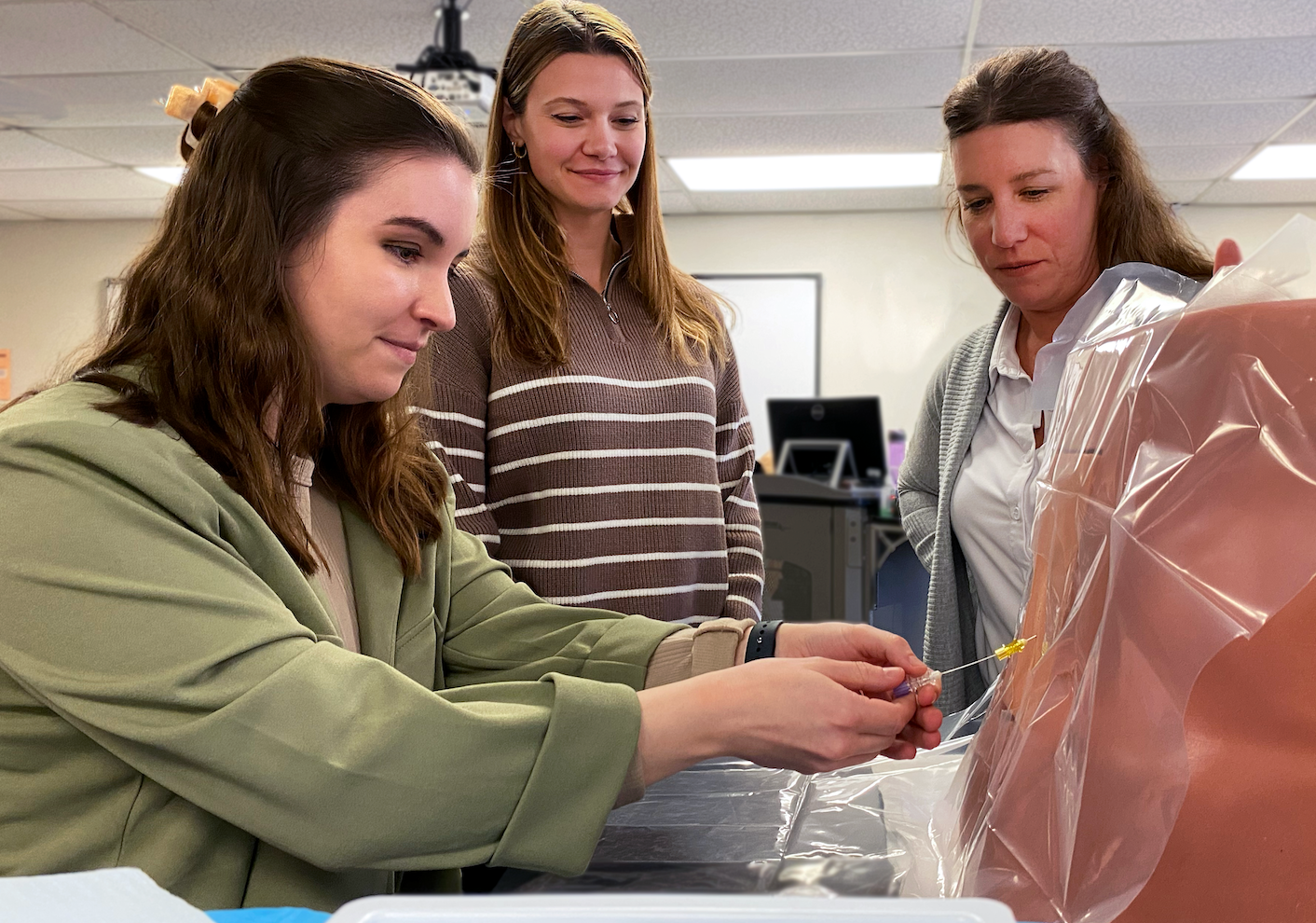
Nurse Anesthesia Program
Doctorate in Nursing Practice
Lourdes University’s Doctor of Nursing Practice Nurse Anesthesia Program (DNP) prepares graduates to sit for the National Certification Examination and certification as a Certified Registered Nurse Anesthetist (CRNA).
To complete the Lourdes DNP Nurse Anesthesia program, students attend full-time for 36 months of continuous coursework, including didactic and clinical practicum. The program comprises nine semesters, including summer, with an additional week for final exams.
Students are also assigned clinical practicum experience during scheduled University breaks and afforded the maximum opportunity to meet the case requirements required by the Council on Accreditation of Nurse Anesthesia Educational Programs (COA).
The COA requires that students matriculating into a nurse anesthesia educational program on or after January 1, 2022, be enrolled in a program approved by the COA to award a practice doctoral degree. The Lourdes Nurse Anesthesia Program has COA approval to award the Doctor of Nursing Practice-Nurse Anesthesia degree.
Plans of Study
DNP NURSE ANESTHESIA PROGRAM CURRICULUM
Curriculum
Total: 97 credit hours
PREREQUISITES OFFERED THROUGH LOURDES UNIVERSITY:
Scientific Writing Course
Theory & Philosophy for Advanced Practice Nursing
Graduate Statistics
Summer Year 1
NUR 712 Advanced Human Anatomy
NUR 711 Scientific Foundations for Anesthesia
NUR 707 Advanced Pharmacology for Anesthesia I
NUR 721 Principles for DNP Anesthesia I
NUR 735 Epidemiology (DNP Core Course)
Fall Year 1
NUR 713 Advanced Health Assessment & Diagnostic Reasoning
NUR 710 Population Health Across Diverse Cultures (DNP Core Course)
NUR 718 Advanced Physiology and Patho Across the Lifespan I
NUR 729 Principles for DNP Anesthesia II
NUR 708 Advanced Pharmacology for Anesthesia II
Spring Year 1
NUR 720 Translational Research for Advanced Practice (DNP Core Course)
NUR 719 Advanced Physiology and Path Across the Lifespan II
NUR 714 Economics for HealthCare Systems & Advanced Nursing Practice
NUR 739 Principles for DNP Anesthesia III
NUR 726 DNP Anesthesia Residency I
Summer Year 2
NUR 740 Information Systems Science, Theory & Tech (DNP Core Course)
NUR 745 Leadership and Transitioning Health Systems (DNP Core Course)
NUR 749 Principles for DNP Anesthesia IV
NUR 736 DNP Anesthesia Residency II
Fall Year 2
NUR 725 Program Planning (DNP Core Course)
NUR 730 Advocacy and Social Policy (DNP Core Course)
NUR 744 Regional Anesthesia and Pain Management
NUR 746 DNP Anesthesia Residency III
Spring Year 2
NUR 750 Translational Research Design (DNP Core Courses)
NUR 756 DNP Anesthesia Residency IV
Summer Year 3
NUR 766 DNP Anesthesia Residency V
NUR 755 Translational Research Implementation (DNP Core Course)
Fall Year 3
NUR 760 Translational Research Projects (DNP Core Course)
NUR 763 Synthesis of Critical Anesthesia Concepts
NUR 768 DNP Anesthesia Residency VI
Spring Year 3
NUR 764 Synthesis of Critical Anesthesia Concepts
NUR 770 DNP Anesthesia Residency VII
Learning Outcomes
NAP Outcomes
The Lourdes University Nurse Anesthesia Program will assess quality and sustainability in the following areas:
- Number of students who complete the program.
- Number of graduates that pass the National Certification Examination for Nurse Anesthetists in accordance with the Council on Accreditation Examination policy.
- Number of graduates who secure employment within 6 months post-graduation.
Nurse Anesthesia Program Learning Outcomes
- Ensure 100% of the students successfully complete the program, but a rate of 92% will be noted as acceptable.
- Establish the benchmark for first time pass rates of the National Certification Examination to be 100%, and a rate of 92% will be noted as acceptable.
- Produce graduates who reflect Franciscan values and best practices related to the advanced role of nurse anesthesia.
- Produce graduates who are committed to the advancement of nursing scholarship as evidenced by professional publication and presentations.
- Document that 90% of graduates are satisfied with the DNP Nurse Anesthesia program of study.
DNP Program Student Learning Outcomes
The student will:
- Display a professional commitment to the Franciscan values of community, learning, reverence and service when leading care of diverse populations in the advanced practice nursing role. (Essential II, VIII, Lourdes Mission)
- Utilize interdisciplinary sciences to establish professional standards that provides safe, effective, efficient evidence-based care in an advanced practice nursing role. (Essential I, VIII)
- Apply evidence-based knowledge in the design and use of theoretical and technological systems to manage individual and aggregate level information to improve and transform healthcare. (Essential I, II, IV)
- Employ communication, leadership and cultural principles to collaborate with multidisciplinary teams in the provision of quality and safety initiatives to improve outcomes at the individual and systems level. (Essential II, VI, VIII)
- Utilize epidemiology to translate evidence-based practice models to improve individual aggregate and population health. (Essential III, V, VII)
- Synthesize, evaluate and discuss impact of ethical, political, economic, legal and more issues as related to healthcare in society. (Essential V, VIII)
Admission Requirements
NURSE ANESTHESIA PROGRAM ADMISSION PROCESS
- Apply for Admission: Complete and submit the online application for graduate students.
- If you have previously applied but did not enroll in courses, please complete and submit a new application so all your records can be updated.
- Request Transcripts: Order transcripts from all colleges and universities attended
- Have electronic copies sent to gradadmit@lourdes.edu OR Have your institution send official hard copies to:
Lourdes University Graduate Admissions
6832 Convent Blvd.
Sylvania, OH 43560
- Academic Requirements:
- Graduation from a nationally accredited nursing program with a bachelor’s degree in nursing or other appropriate nursing major from a regionally accredited college or university.
- Cumulative GPA of 3.0 or higher
- Course content and a grade of 3.0 in Anatomy and Physiology, Inorganic and Organic Chemistry
- Provide Recommender Information: Provide name, organization, position/title, relationship, phone number & email address of three recommenders:
- A peer who works with you
- An immediate supervisor, someone who performs or can evaluate you in the workplace
- A physician, nurse practitioner, or physician assistant you have worked closely with in a critical care area.
- Provide Proof of Current Certifications and Current Licensure: All copies of current documents/licenses/certifications can be uploaded into your application.
- ACLS
- BLS
- CCRN with scores
- PALS
- Unrestricted Nursing License – All licenses if more than one
- Resume or CV
- Critical Care Work Experience – Submit documentation citing your critical care work experiences using the form located here.
- Critical care areas include SICU, MICU, CICU, NICU, PICU, Neuro ICU, and ER. ER nursing may be considered as fulfilling this requirement and will be individually considered based on the acuity/intensity of the ER.
- Shadowing Experience: Complete a minimum shadowing experience of 1-2 days (8-16 hours) with a CRNA or anesthesiologist. Please use this form to record your shadowing experiences.
- Pay Application Fee: Pay the $50 Application Fee electronically by accessing – NAP Application Fee Payment Form.
- Application Review: The application review process takes several weeks. Once this process is complete, invitations to interview will be sent via email. Applicants not granted an interview will be informed via email.
- Admission Decision: Admission decisions will be sent via email. All interviewees will receive an admission decision.
Program Statistics
Nurse Anesthesia Program (NAP) Statistics Inaugural Cohort 1
- 13 students enrolled in inaugural NAP Cohort
- 8% attrition rate
- 92% Graduation rate
- 83% NCE (Board) 1st-time pass rate
- 100% NCE (Board) pass rate by March 1, 2014
- 100% of graduates have been employed or secured employment within 3 months of graduation. Many of the graduates have been employed in the clinical facilities which serve as practicum sites for the NAP.
Nurse Anesthesia Program (NAP) Statistics Cohort 2
- 12 students enrolled in NAP Cohort 2
- 8% attrition rate
- 92% Graduation rate
- 91% NCE (Board) 1st-time pass rate
- 100% NCE (Board) pass rate by March 1, 2015
- 100% Employment by March, 2015. Many of the graduates have been employed in the clinical facilities which serve as practicum sites for the NAP.
Nurse Anesthesia Program (NAP) Statistics Cohort 3
- 13 students enrolled in the NAP Cohort
- 8% attrition rate
- 92% Graduation rate
- 67% NCE (Board) 1st-time pass rate
- 83% NCE (Board) pass rate by December 31, 2015
- 100% NCE (Board) pass rate by April 1, 2016
- 100% of graduates were employed by graduation December, 2015. Many of the graduates have been employed in the clinical facilities which serve as practicum sites for the NAP.
Nurse Anesthesia Program (NAP) Statistics Cohort 4
- 15 students enrolled in the NAP Cohort
- 14% attrition rate
- 86% Graduation rate
- 69% NCE (Board) 1st-time pass rate
- 92% NCE (Board) pass rate by April, 2017
- 100% of graduates were employed by graduation December, 2016. Many of the graduates have been employed in the clinical facilities which serve as practicum sites for the NAP.
Nurse Anesthesia Program (NAP) Statistics Cohort 5
- 15 students enrolled in the NAP Cohort
- 6% attrition rate
- 94% Graduation rate
- 67% NCE (Board) 1st-time pass rate
- 100% NCE (Board) pass rate by February, 2018
- 100% of graduates were employed by graduation December, 2017. Many of the graduates have been employed in the clinical facilities which serve as practicum sites for the NAP.
Nurse Anesthesia Program (NAP) Statistics Cohort 6
- 15 students enrolled in the NAP Cohort
- 7% attrition rate
- 93% Graduation rate
- 93% NCE (Board) 1st-time pass rate
- 100% NCE (Board) pass rate by March, 2019
- 100% of graduates were employed by March 2019. Many of the graduates have been employed in the clinical facilities which serve as practicum sites for the NAP.
Nurse Anesthesia Program (NAP) Statistics Cohort 7
- 17 students enrolled in the NAP Cohort
- 12% attrition rate
- 93% graduation rate
- 93% NCE (Board) 1st-time pass rate
- 100% NCE (Board) pass rate by December 30, 2019
- 100% of graduates were employed or secured employment by January 2020. Many of the graduates have been employed in the clinical facilities which serve as clinical practicum sites for the NAP.
Nurse Anesthesia Program (NAP) Statistics Cohort 8
- 10 students enrolled in the NAP Cohort
- 10% attrition rate
- 90% graduation rate
- 90% NCE (Board) 1st-time pass rate
- 100% NCE (Board) pass rate by December 30, 2020
- 100% of graduates were employed or were securing employment by January 2021. Many of the graduates have been employed in the clinical facilities which serve as clinical practicum sites for the NAP.
Nurse Anesthesia Program (NAP) Statistics Cohort 9
- 17 students enrolled in the NAP Cohort 9
- 0% attrition rate
- 100% graduation rate
- 94% NCE (Board) 1st-time pass rate
- 100% of graduates were employed or were securing employment by January 2022. Many of the graduates have been employed in the clinical facilities which serve as clinical practicum sites for the NAP
Nurse Anesthesia Program (NAP) Statistics Cohort 10
- 18 students enrolled in the NAP Cohort 10
- 0% attrition rate
- 100% graduation rate
- 88% NCE (Board) 1st time pass rate
- 100% graduates were employed by January 2023. Many of the graduates have been employed in the clinical facilities which serve as clinical practicum sites for the NAP
Nurse Anesthesia Program (NAP) Statistics Cohort 11
- 16 students enrolled in the NAP Cohort 11
- 0% attrition rate
- 100% graduation rate
- 88% NCE (Board) 1st time pass rate
- 94% NCE (Board) pass rate by December 30, 2023
- 94% graduates were employed by January 2024. Many of the graduates have been employed in the clinical facilities which serve as clinical practicum sites for the NAP
2025 NAP Conference Registration
Saturday, April 26, 2025
Hilton Garden Inn Perrysburg
6165 Levis Commons Blvd.
Perrysburg, OH 43551

